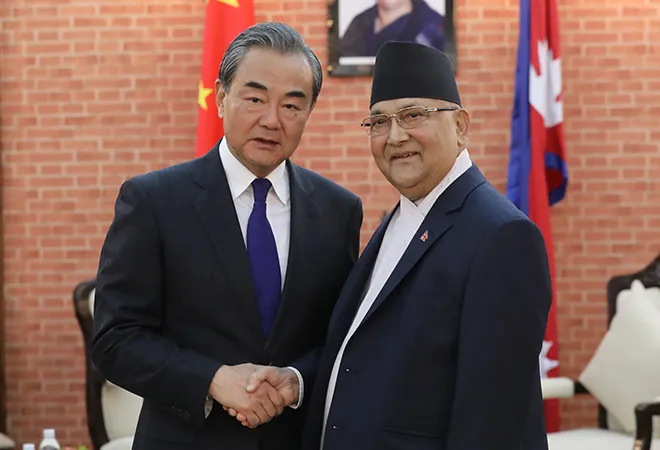-
CENTRES
Progammes & Centres
Location
Nepal's balancing act between the two development and infrastructural projects—the MCC aided by the USA and the BRI promoted by China—can hinder its bilateral ties with China.

Ever since the establishment of diplomatic relations between Nepal and China on 1 August, 1955, never had the relations between the two countries deteriorated to the extent it has in the past two years following the outbreak of COVID-19. The business communities of Nepal who engage in trade with China have protested, time and again, against China for closing the border. The issue of a huge trade deficit with China is a matter of concern for Nepal. Tensions between the two countries peaked after Nepal ratified the American grant assistance, amounting to US$500 million under the Millennium Challenge Corporation (MCC) on 27 February 2022, against the wishes of the Chinese government.
The growing thaw in Sino-Nepal relations became all the more apparent when the Chinese Foreign Minister Wang Yi, during his visit to Nepal on 25-27 March, warned Nepal about the external interference that threatened the core interests of Nepal and China. China wanted Nepal to stand “neutral” between its two neighbours, India and China, and desist from being dragged by the US and India, and form an anti-Chinese front.
In certain quarters, it is feared that Washington could use MCC as a ploy to counter China’s Belt and Road Initiative (BRI) in future. Beijing’s BRI, of which Nepal is a signatory, and the American MCC that Nepal ratified recently overlap as they both focus on the development of Nepal’s infrastructure sector.
China wanted Nepal to stand “neutral” between its two neighbours, India and China, and desist from being dragged by the US and India, and form an anti-Chinese front.
Nepal believes that the MCC projects are designed in a way that could strengthen the cross-border transmission of electricity between Nepal and India, and also that the sale of surplus power to India would be a continuous source of income for Nepal, apart from generating employment opportunities and accelerating the growth of the Nepalese economy.
After Nepal ratified the MCC, Beijing tried to influence Nepal to accept loans for certain projects under the BRI. However, Prime Minister Sher Bahadur Deuba made it clear that Nepal wanted only grant projects from China and not loans.
Nepal insisted that if at all they had to take loans, it should be a soft or concessional loan with a minimal interest rate, not exceeding 2 percent. The country favoured only such loans from Beijing that were of international standards, like the one provided by multilateral institutions like the World Bank or the Asian Development Bank. It only wanted such projects under the BRI that would be open to all for bidding, not just the Chinese firms like in other BRI projects.
Nepal’s concerns about discouraging loans from China seem to be genuine. Till the second quarter of the current fiscal year 2020-21, the country’s debt to GDP ratio peaked at 40.53 percent, which is quite alarming if compared to the situation in 2015-16, when it marked merely 25.65 percent.
Nepal also raised the question of the Nepalese students studying in different Chinese universities who are now stranded in Nepal. They were evacuated from China in the wake of the outbreak of COVID-19. China has made little effort to resume classes for them.
Nepal has a huge deficit in the balance of trade with China. In 2020-21, Nepal imported goods worth NPR 2 33.92 billion from China, but during the same period the country exported goods worth NPR 1 billion only. The country’s trade deficit with China reached the tune of NPR 232.90 billion, which formed 14 percent of the country’s total trade deficit.
Nepal has a huge deficit in the balance of trade with China. In 2020-21, Nepal imported goods worth NPR 2 33.92 billion from China, but during the same period the country exported goods worth NPR 1 billion only.
All international flights have been halted between the two countries ever since the outbreak of COVID-19. Along with this, the border checkpoints with China—Tatopani-Zhangmu and Rasuwagadhi-Kerung—are closed, hindering the two-way movement of people and goods between the two countries.
Nepal is concerned about the increasing interference by China in Nepal’s internal affairs. Geja Sharma Wagle, an analyst on strategic and foreign affairs, has said that Beijing made ‘unnecessary, undiplomatic, and hostile comments on the MCC compact’ without understanding that it was a not only bilateral but also domestic issue between Nepal and the USA.
However, to improve China’s relations with Nepal, Nepal and China signed altogether nine agreements, during Yi’s visit to Nepal, which included economic and technical cooperation, feasibility study of the China-Nepal cross-border project, feasibility study of China-Nepal power grid interconnections, and duty-free treatment for 98 percent of the goods imported in China. The two countries also agreed to conduct a detailed project report of the Kerung-Kathmandu railway project in four years.
China also agreed to revive the boundary inspection mechanism which remained dormant ever since 2006. Besides, China assured Nepal that it would try to mitigate the problem of those Nepalese students studying in China who could not resume their studies in Chinese universities after they returned to Nepal following the outbreak of COVID-19.
To reap the advantages of haylage cultivation, some Chinese companies have already invested in the production of this grass in the Chitwan district, which is also produced in Nawalparasi, Gorkha, and Dang districts.
In another agreement, Nepal agreed to export haylage to China. The haylage is a kind of grass that is used as animal fodder to feed horses, yaks, and goats in Tibet. Since it has a high nutrient value, it increases milk production in the animals. To reap the advantages of haylage cultivation, some Chinese companies have already invested in the production of this grass in the Chitwan district, which is also produced in Nawalparasi, Gorkha, and Dang districts.
Given the rivalry between the US and China on the one hand and the rivalry between India and China on the other, it has become challenging for Nepal to maintain a balance in its relations with all of them. It can’t afford to antagonise one of these power centres for the other. The USA’s role in Nepal cannot be undermined for it happens to be the biggest development partner of Nepal for the last 75 years. In the same way, China and India are also important as they are immediate neighbours. Amidst this situation, the strong stand that Nepal has taken by denying projects under BRI appears in the national interest, and for this, the Deuba government deserves to be given due credit. Under the current geoeconomic and geopolitical games, Nepal should focus on independent foreign policy and promote diplomatic balance with all these powers, while keeping an eye on national interest.
The views expressed above belong to the author(s). ORF research and analyses now available on Telegram! Click here to access our curated content — blogs, longforms and interviews.

Hari Bansh Jha was a Visiting Fellow at ORF. Formerly a professor of economics at Nepal's Tribhuvan University, Hari Bansh’s areas of interest include, Nepal-China-India strategic ...
Read More +